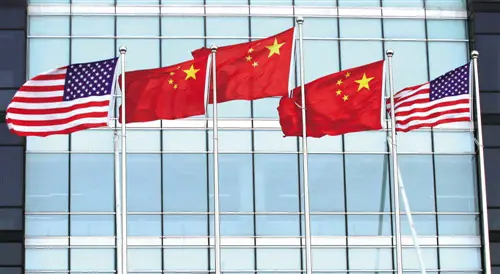Ongoing negativity surrounding US tech companies has seen some of China’s biggest companies feeling the burn as global stock prices continue to slump.
The ongoing Cambridge Analytica scandal is continuing to weigh down on Facebook, while the prospect of restrictions on Chinese investments in US tech and new reports that President Donald Trump wants “to go after” Amazon have put more pressure on the sinking tech sector.
E-commerce giant Alibaba, which has been listed on Wall Street since 2014, has seen its share price fall by more than 10 percent in the past two weeks, while Hong Kong-listed Tencent has plummeted by more than 12 percent in the same period.
2018 is already looking like a much more turbulent year than 2017 on Wall Street and other markets.
For Chinese companies listed on US tech index NASDAQ, the situation is even more perilous. Baidu has fallen by more than 16 percent since the beginning of the global tech slump, wiping billions of dollars from its value.
The end of the beginning in the tech era?
Recent years have seen tech stocks dominate and lead global markets. The FAANGs – Facebook, Amazon, Apple, Netflix and Google (under Alphabet) – were leading the pack as Wall Street saw record gains through 2017, while China’s BATs (Baidu, Alibaba and Tencent) also cemented themselves as investor favorites.
Cracks in overall stock market confidence began to appear earlier this year, when US stocks fell to a six-year low before eventually recovering in February.
The latest slump began as reports on the Cambridge Analytica scandal emerged, as Facebook struggled to turn around investor negativity. Facebook’s 80 billion US dollar slump since announcing it was suspending its cooperation with Cambridge Analytica has meant a serious knock-on effect for other tech companies.
Struggling to explain: A tough two weeks for Facebook founder Mark Zuckerberg.
Public pressure over how data is used and the role of tech and social media in politics has led to calls for greater regulation on the sector. Twitter has nosedived by around 20 percent, while Alphabet’s seven percent slump shows just how much tech is struggling to swim against the tide.
On Wednesday, it was Amazon’s turn to feel the heat, with a report by Axios suggesting that US President Trump is “obsessed with Amazon.”
Trump is understood to be unhappy about the effect of Amazon’s business model on smaller independent stores in the US, with Axios claiming the president is considering a change to the way Amazon is taxed.
What a difference a year makes: In December 2016, president-elect Donald Trump sat with and looked to forge close ties with tech leaders including Amazon's Jeff Bezos, Facebook's Sheryl Sandberg, Google's Larry Page and Apple's Tim Cook.
Shares in the company fell by more than five percent, resulting in losses of more than 30 billion US dollars.
Certain media are speculating whether Trump has ulterior motives – Amazon owner Jeff Bezos also owns The Washington Post, a long-term critic of Trump that the president has called “fake news.”
Why are Chinese companies getting hit by this?
Beyond the ongoing problems facing Facebook and now Amazon, Chinese tech companies are suffering in particular after reports that the US will restrict Chinese investment in its tech companies.
Listed on the New York Stock Exchange and NASDAQ respectively, Alibaba and Baidu have been particularly exposed to the shockwaves of the US tech slump.
Baidu founder Robin Li came under fire in China this week for claiming Chinese people care less about data privacy.
Interestingly, reports emerged on March 15 (the day before the tech slump) that Alibaba was considering a listing in China.
Whether that was fortunate timing or a clever leak to the media ahead of Facebook’s data scandal, the news boosted the company’s share price by more than 3.5 percent, softening the blow of the oncoming stock drop.
Tencent’s perfect storm
The US tech slump has spread to other markets, with the Nikkei and Shanghai Composite Index dropping by around 2.5 and 4.4 percent respectively, but Tencent’s 12 percent drop on Hong Kong’s Hang Seng index suggests other factors are combining to the company’s downturn.
The company has seen more than 70 billion US dollars wiped from its value, with investors concerned that growth is losing steam, with a 98 percent boost to revenues in the most recent quarter not enough to meet market expectations.
The company’s gaming sector has disappointed in recent months, while growth in WeChat users is also slowing down.
To make matters worse, South African media company Naspers, one of Tencent’s biggest and oldest financial backers, sold 10 billion US dollars’ worth of stock last week, arousing investor suspicion despite promising it still supported Tencent in the long term.
Naspers was not the only investor to cash in on Tencent stock. Even the company’s president, Martin Lau, sold more than 55 million US dollars’ worth of shares on Wednesday.
The company has lost the prestigious crown of passing the 500 million US dollar market cap milestone, with its value now falling to 499 million dollars.
(CGTN)
 简体中文
简体中文

